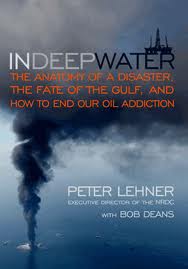 Five months after the Deep Horizon oil spill, the first book detailing the BP Oil Disaster has been released by Natural Resources Defense Council (NRDC) Executive Director, Peter Lehner. “In Deep Water,” chronicles the events leading up to the disaster, the mistakes made during the catastrophe and offers solutions for moving forward in a manner that will limit future offshore oil spills.
Five months after the Deep Horizon oil spill, the first book detailing the BP Oil Disaster has been released by Natural Resources Defense Council (NRDC) Executive Director, Peter Lehner. “In Deep Water,” chronicles the events leading up to the disaster, the mistakes made during the catastrophe and offers solutions for moving forward in a manner that will limit future offshore oil spills.
On April 20, 2010, BP’s Macondo well blew in the Gulf of Mexico killing 11 workers. By the time the well was capped, 87 days later, the well spewed hundreds of millions of gallons of toxic oil into the Gulf making this the worst oil spill the globe has ever known. Lehner writes, “The Macondo blowout is another national wake-up call, a sobering plea for action on the greatest environmental challenge of our time: finding a way out of the economic and social model we’ve built around fossil fuels, and forging a future built instead around the clean energy technologies of tomorrow.”
The quest for oil has encouraged oil companies to drill deeper and deeper into the ocean. According to the latest government and industry estimates, nearly 40 billion barrels of oil lie in American waters in the Gulf, much of it buried miles and miles deep in the Earth. At $75 a barrel, the oil is worth $3 trillion.
 Unfortunately, Lehner writes, the lack of proper government oversight and the embellishments of the oil companies in their ‘environmental plans’ in case of oil spills, highlighted technology that doesn’t exist. A reality that became difficult to bear as the world watched in horror the inability of BP to cap the well. The spill, explained Lehner, also highlighted the failure of policy, one that existed well before the catastrophe.
Unfortunately, Lehner writes, the lack of proper government oversight and the embellishments of the oil companies in their ‘environmental plans’ in case of oil spills, highlighted technology that doesn’t exist. A reality that became difficult to bear as the world watched in horror the inability of BP to cap the well. The spill, explained Lehner, also highlighted the failure of policy, one that existed well before the catastrophe.
So what happens now? According to Lehner, a Natural Resources Damages Assessment (NRDA) is currently being undertaken and is a critical document as the conclusions it contains will provide the basis for a larger body of federal actions, legal decisions and restoration plans.
Lehner concludes by highlighting that we consume 800 million gallons of oil per day. “If we could tap every barrel of oil known or thought to be lying beneath the entire U.S. portion of the Gulf of Mexico- all 1.7 trillion gallons of it – we could use up every drop, under current consumption rates, in just under six years.” This is a sobering statistic.
Finally, Lehner offers solutions to curb our fossil fuel use and cautions that the book is just the first draft of an ongoing study of the crisis.

